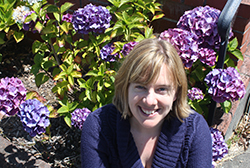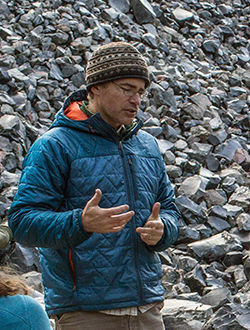Professor Marissa Ramsier, Dept. of Anthropology

Where are you originally from?
Eureka, California
Where did you complete your education?
University of California, Santa Cruz
Why did you choose your field?
It allows to explore and integrate many different areas of science.
Where have you taught prior to coming to HSU?
I was a teaching assistant at UCSC, and then a postdoctoral fellow at the Max Planck Institute for Evolutionary Anthropology in Leipzig, Germany. I have also served as a lecturer at HSU.
What are your specific areas of expertise?
Comparative anatomy and ecology, primatology, human evolution, bioarchaeology.
What classes are you teaching this year?
Biological Anthropology, Paleoanthropology, and courses for the MA in Applied Anthropology program.
What attracted you to Humboldt State?
The opportunity to work closely with students that are excited about learning.
What do you do in your free time outside the classroom?
Spend time with my boys! Experiment with building and “fixing” things.
What is your favorite classroom technique to engage students?
Team-based learning – it’s amazing watching students empower each other and work together.
What is the best thing about being a university professor?
Keeps me on my toes – a great excuse to stay current on what is happening in science and explore new areas.
Where is the strangest place you’ve done research?
I have enjoyed living for weeks or months at a time in tents and field cabins, with monkeys breaking into my “kitchen.” Not strange, just fun!
If you weren’t an HSU professor, what would you be?
Bored.
What superpower would be most valuable to your research?
Time travel, of course!
Professor Brandon L. Browne, Dept. of Geology

Where are you originally from?
I grew up in southern California in the town of La Cañada.
Where did you complete your education?
I attended Oregon State University, where I earned a BS in Geology and a BS in Environmental Science. I later attended the University of Alaska in Fairbanks, where I earned MS and PhD degrees in Geology.
Why did you choose your field?
As a high school student, I was attracted to some kind of career in science that allowed me to spend lots of time outdoors, so I applied to colleges with strong natural science programs with opportunities for undergrads to engage in field-based classes (including HSU, actually). I ended up attending Oregon State University and initially pursued a degree in Forestry. I enjoyed my forestry classes, but an introductory geology class that I took as a sophomore wholly changed my perspective on the earth and the way I thought about the world around me.I was totally hooked and changed my major to geology immediately. The following summer I worked as an interpretive ranger at Crater Lake National Park. Learning about the volcanic history of Crater Lake was fascinating, so I pursued an undergraduate thesis project on a volcano-related theme in northeastern Oregon, and soon after started contacting professors about graduate opportunities in volcanology. The University of Alaska in Fairbanks offered the most exciting field- and lab-based research opportunities, plus loads of adventure, so I went there and have been studying volcanoes ever since.
Where have you taught prior to coming to HSU?
I taught in the geology departments at Cal State Fullerton and Occidental College prior to coming to HSU.
What are your specific areas of expertise?
I study volcanoes. In particular, students and I work to understand the different ways that volcanoes erupt, what kinds of hazards different eruption styles pose, and what kinds of processes – and over what timescales – volcanic eruptions are triggered. My research advances both our understanding of volcanic hazards and how to better predict volcanic eruptions.
What classes are you teaching this year?
I’m teaching classes on the identification, classification, and interpretation of the origin of rocks and minerals, including Earth Materials (GEOL 312) and Instrumental Methods in Geology (GEOL 482) in the fall. I will be teaching Optical Mineralogy and Petrography (GEOL 314), and another geology course in the spring.
What attracted you to Humboldt State?
HSU’s strong reputation in natural sciences, dedication to involving students in research, and beautiful location all attracted me to HSU.
What do you do in your free time outside the classroom?
I enjoy hiking, backpacking, and spending time with my family outdoors.
What is your favorite classroom technique to engage students?
One of the best things about teaching geology is that the natural world is our classroom. Taking students into the field to observe, describe, and analyze different geological phenomena is a particularly powerful way to engage and stimulate geology students. I loved it as a student and continue to utilize it as a professor to engage and inspire my own students.
What is the best thing about being a university professor?
Getting paid to teach classes and study geological processes with motivated and enthusiastic students on fascinating scientific topics is one of the best things about being a university professor. We are additionally lucky at HSU though, as we also have the benefit of working in a beautiful place and being part of a collaborative, supportive, and talented community of faculty and staff.
Where is the strangest place you’ve done research?
I don’t know about “strange”, but studying volcanoes in Kamchatka, Russia was certainly a unique experience! The culture, climate, and unusually high amount of volcanic activity make it a truly unique place to study.
If you weren’t an HSU professor, what would you be?
Being an HSU professor is pretty terrific, but if didn’t have this job, I would pursue something else that combined my interests in science, education, and working outdoors, like a geologist for a state or federal agency or maybe as a science communicator for a volcano observatory. I’ve always enjoyed thinking about working on a stone-fruit orchard or in a craft brewery, too.
What superpower would be most valuable to your research?
Fortunately, geologists already possess superpowers! We can travel back in time, use X-ray vision to analyze the chemical composition of rocks, look hundreds of kilometers underground into the earth’s interior, and leap over mountains in a single bound!